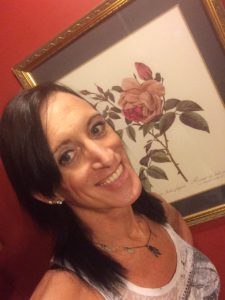Reposted with permission from the original found here.
 by Katie Willingham
by Katie Willingham
April 26, 2021
Many of us tend to self-diagnose. I know I used to — I was too stubborn to go to the doctor. My obstinance nearly killed me.
I have been living with HIV since June 2000, but I almost didn’t survive my diagnosis. See, my first symptoms were misdiagnosed — by everyone! First, I misdiagnosed myself. In 1999, I was a three-pack-a-day smoker and had been for years, so when I started experiencing shortness of breath, it was no surprise. I considered it a consequence of smoking and moved on. I also had very little appetite, but I didn’t think much of that either — it was somewhat normal for me. But after a few months of my breathing growing considerably worse, I researched my symptoms and decided I needed to be diagnosed and treated for COPD or emphysema.
I didn’t have a regular doctor, so I looked up a local medical mall and made an appointment to be seen. X-rays were taken of my lungs, and when the doctor returned, he said he would be treating me for anxiety. Anxiety?? I had just gotten my job back after a long layoff and had been given a good raise. My marriage was great, the kids were healthy, the bills were paid — why would I have anxiety? My life was going great! I knew this wasn’t anxiety, but I couldn’t convince my doctor of that.
Weeks turned into months and my breathing only got worse. I would tell the doctor that I was still having trouble breathing and eating, and he would only change my medication to another anxiety prescription. I couldn’t walk across my house without losing my breath, and for Thanksgiving, I couldn’t finish a sandwich, but my doctor would still only prescribe a different anxiety medication. I feel like I wasted months on a physician who wouldn’t listen to me.
 I started searching for another doctor. My aunt referred me to her primary care doctor, whom she seemed really impressed with, so I called and made an appointment. When I walked into the office, the nurse said that I was as blue as a Smurf, and they immediately called an ambulance. I would spend the next 10 horrifying days in the hospital dangling between life and death, not knowing which would be my fate. They tested everything for days with no answers. The doctors all seemed at wits’ end when finally, a test came back with an answer. But it wasn’t an answer anybody wants to hear.
I started searching for another doctor. My aunt referred me to her primary care doctor, whom she seemed really impressed with, so I called and made an appointment. When I walked into the office, the nurse said that I was as blue as a Smurf, and they immediately called an ambulance. I would spend the next 10 horrifying days in the hospital dangling between life and death, not knowing which would be my fate. They tested everything for days with no answers. The doctors all seemed at wits’ end when finally, a test came back with an answer. But it wasn’t an answer anybody wants to hear.
I heard “AIDS” and “you have” — that’s about all I remember being said. It was that numb feeling like an explosion next to your ear and the ensuing ringing that blocks out all other sounds. I remember thinking what everyone probably thinks when they hear AIDS: “I’m going to die.” I was told to get my affairs in order and given 1 to 5 years to do so. I would later learn that I had a rare pneumonia called PCP pneumonia. This was why I couldn’t breathe, and my stomach was full of yeast, which made me always feel full, both explainable with an AIDS diagnosis, and fortunately, treatable as well. A week or so of antibiotics would have me eating again and turning back to my natural color, and an antiretroviral therapy regimen would see me undetectable within a year (undetectable means that there is not enough virus in the blood to be counted, but still positive).
 Thanks to advancements in HIV science, becoming a proactive partner in my health care, and maintaining adherence to treatment, I’ve lived a productive and dignified life far beyond original expectations. But I might not have benefited from any of these things had I not stepped out of my norm, surrendered my stubbornness, and sought professional help. And even with professional help, I still had to know my body, trust my instincts, and become a proactive part of my health care.
Thanks to advancements in HIV science, becoming a proactive partner in my health care, and maintaining adherence to treatment, I’ve lived a productive and dignified life far beyond original expectations. But I might not have benefited from any of these things had I not stepped out of my norm, surrendered my stubbornness, and sought professional help. And even with professional help, I still had to know my body, trust my instincts, and become a proactive part of my health care.
There are a million reasons why some of us choose not to seek medical care, but self-diagnosis can be dangerous. Health information sites — like the one you’re on right now — are not a substitute for a professional evaluation. They are a resource to support your research to prepare you to ask your physician questions, making you a proactive part of your own health care.
If you feel ill, research your symptoms so you’ll be prepared to have an informed conversation with your physician, but don’t diagnose yourself. Trust the advice of a trained doctor but remember that they too are human. Know your body, listen to your body, and make sure your doctor listens to you. Always remember, your health care is a team effort, so be involved. No one’s authority supersedes your experience with your own body.
Don’t let fear or stubbornness keep you from seeking a diagnosis — and don’t be afraid to challenge one that you disagree with — because getting the right diagnosis could save your life.


